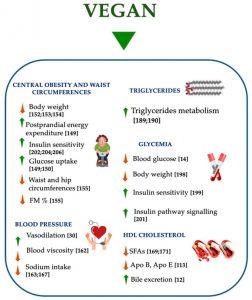The rising prevalence of metabolic syndrome (MetS) globally, dietary approaches such as vegan diets are becoming central to prevention and management strategies. Metabolic syndrome is characterized by a cluster of conditions, including hypertension, elevated blood sugar, excess abdominal fat, and abnormal cholesterol levels, all of which increase the risk for cardiovascular disease, diabetes, and stroke. A well-balanced vegan diet may offer a sustainable way to reduce these risks through nutritional strategies emphasizing high fibre, antioxidants, and lower saturated fat intake.
Additional article: Unveiling the Epigenetic Impact of Vegan vs. Omnivorous Diets on Aging: Insights from the Twins Nutrition Study
Research indicates that individuals adhering to vegan diets often experience lower body mass indexes (BMIs) and improved lipid profiles compared to omnivores. The low saturated fat content and high fibre intake in vegan diets reduce cholesterol levels, enhance insulin sensitivity, and contribute to lower blood pressure. The American Heart Association recommends fibre-rich diets to support cardiovascular health, and plant-based diets generally contain significant amounts of dietary fibre from fruits, vegetables, legumes, and whole grains. Additionally, replacing animal proteins with plant proteins reduces the presence of pro-inflammatory markers and helps stabilize blood glucose.

Figure 2: Effects of vegan diet on metabolic syndrome. APO, apolipoprotein; FM, fat mass; SFAs, saturated fatty acids; ↑ increase; ↓ decrease.
While beneficial, vegan diets require careful planning to avoid deficiencies in nutrients such as vitamin B12, iron, and omega-3 fatty acids. Including fortified foods or supplements can support adequate nutrient intake for those following vegan diets. For individuals with metabolic syndrome, monitoring nutrient levels and ensuring an adequate intake of these critical nutrients is essential for sustained health benefits.
A vegan diet provides substantial health benefits for managing metabolic syndrome when planned well. By reducing the intake of saturated fats and incorporating a variety of plant-based foods, individuals may experience improvements in weight, blood pressure, and cholesterol, supporting cardiovascular and metabolic health.
Summary by Faith Oluwamakinde











